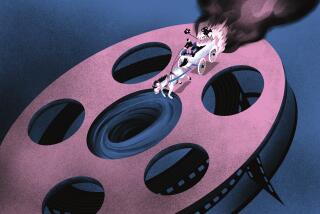Review: Involved ‘Final Master’ is not your typical martial arts epic
In the Chinese martial arts saga “The Final Master,” set in the 1930s, blades replace fists, but realistically beautiful movement trumps fantasy bloodletting and sardonic wit replaces heroic earnestness. An often convoluted story of honor and betrayal surrounding the establishment of a martial arts academy, writer-director Xu Haofeng’s movie doesn’t feel like many other movies of its ilk. That’s mostly a good thing, even if the movie can’t quite fit all its eccentric pieces into a satisfying whole.
Traveling master Chen (Liao Fan), a stern, composed man from the south of China, arrives in northern martial arts hub Tianjin with the mission of passing down his beloved Wing Chun style of butterfly-sword fighting — which he fears will be lost to history — by founding a school. The local grandmaster Zheng (Jin Shi-Jye) informs him that to do so, Chen will have to fight and defeat representatives from eight rival academies. And even that’s not a guarantee, since such an incredible feat would be enough of a blot on Tianjin’s reputation that the victor would have to be defeated and banished, by any means necessary.
Zheng’s suggested alternative is a proxy combatant, an apprentice whom Chen will train and then be exiled in Chen’s place so the school can open. Plucked for the job (and kept ignorant of the intended result) is a hotheaded laborer named Geng (Song Yang). As Geng starts racking up wins, though, the careful balance of power in Tianjin — heavily influenced by a scheming, androgynous academy head named Madam Zou (Jiang Wenli), who welcomes the growing military’s encroachment on classic martial arts techniques — is in danger of being upset. Chen is forced to examine what he’s willing to sacrifice in order to glorify his art.
Xu, adapting his own short story, is no stranger to scenarios where personal emotions cloud professional ambitions (and vice versa) — he also wrote the screenplay for Wong Kar Wai’s “The Grandmaster,” which pitted martial arts styles and temperaments from North and South against each other to rapturous cinematic effect (thanks to its gifted director). Here, Xu is less canny with narrative and character — it’s often confusing whose loyalties lie where at any given moment, despite the enjoyable performances — than he is with the quick-footed, polished aggression of credible knife fights, which Xu choreographed himself.
Given the rare respect of long takes, full-body framing and rhythmic cinematography one usually associates with musicals, the square-offs — less about steel-on-skin contact than asserting kill point dominance — come in a welcome variety of tones: from cheeky to intense, and in a final showdown against multiple comers with different sized and shaped blades in a narrow alleyway, muscularly breathtaking.
But elsewhere, “The Final Master” strains for cynical weight about individualism versus rigged political systems, and a Chinese republic finding its way in an increasingly faction-minded 20th century. The action ending may exert a mythic power regarding the ability of one man to assert his destiny against many forces, but where the movie ultimately leaves its characters — whether compromised, cornered, or even dead — is too ambiguous to have any meaningful effect. Though “The Final Master” has more on its mind than a lot of martial arts films, it’s those thrusting, arcing knives and graceful bodies in motion that tell the real story.
-------------
‘The Final Master’
In Mandarin with English subtitles
Running time: 1 hour, 49 minutes
Not rated
Playing: In limited release
More to Read
Only good movies
Get the Indie Focus newsletter, Mark Olsen's weekly guide to the world of cinema.
You may occasionally receive promotional content from the Los Angeles Times.






